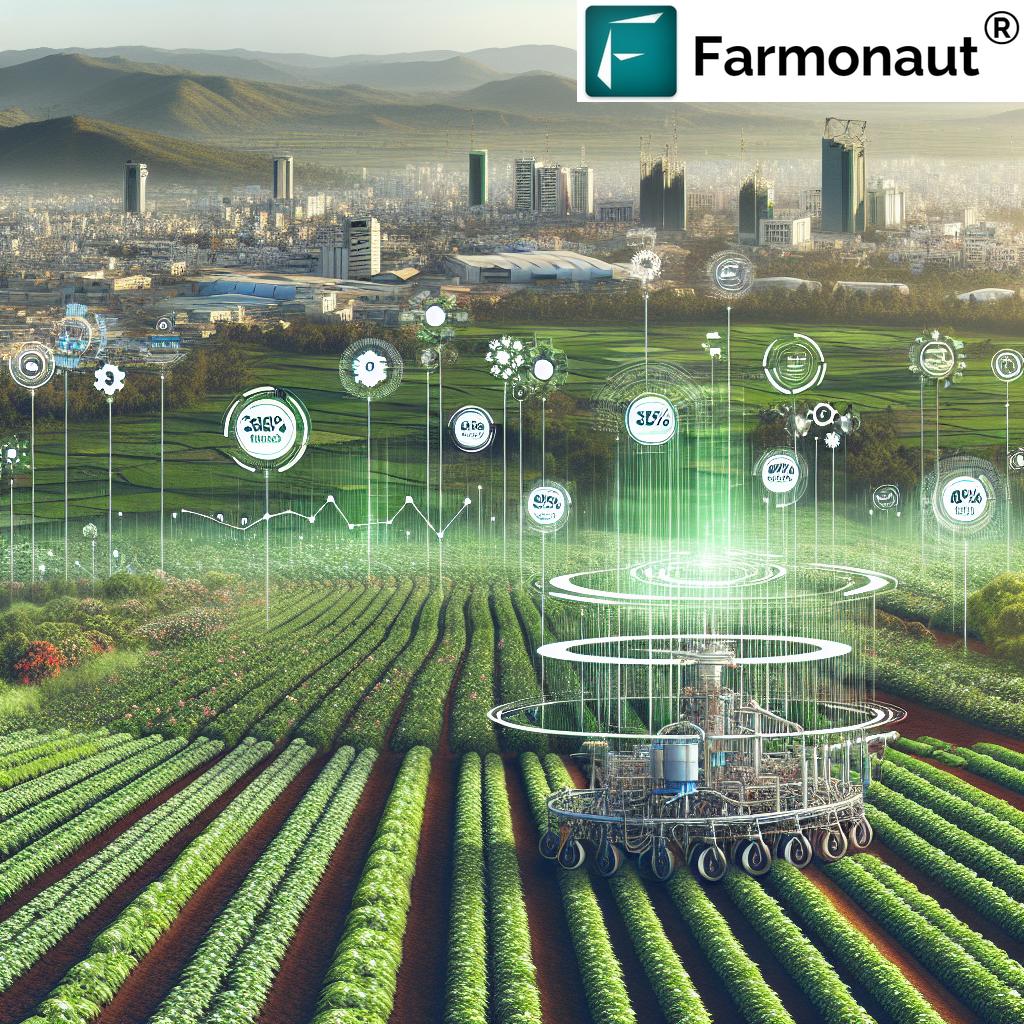Revolutionizing Rural Development: Farmonaut’s Smart Farming Technologies for Sustainable Agricultural Growth

“Precision agriculture techniques can increase crop yields by up to 30% while reducing water usage by 50%, according to recent studies.”
In the ever-evolving landscape of agriculture, we are witnessing a remarkable transformation driven by innovative technologies and sustainable practices. Rural development projects and agriculture finance schemes are at the forefront of this revolution, reshaping India’s agricultural sector and fostering prosperity in rural areas. In this comprehensive guide, we’ll explore how smart farming technologies, particularly those offered by Farmonaut, are revolutionizing the industry and paving the way for sustainable agricultural growth.
The Dawn of Smart Farming in Rural Development
As we delve into the world of modern agriculture, it’s crucial to understand the pivotal role that smart farming technologies play in rural development. These innovative solutions are not just changing the way we farm; they’re transforming entire communities and economies.
- Precision Agriculture: At the heart of smart farming lies precision agriculture, a concept that leverages data-driven insights to optimize crop yields and resource utilization.
- Crop Monitoring Technology: Advanced sensors and satellite imagery provide real-time data on crop health, soil conditions, and weather patterns.
- Farm Management Software: Digital platforms integrate various aspects of farm operations, from planning to harvest, streamlining decision-making processes.
Farmonaut stands at the forefront of this agricultural revolution, offering cutting-edge solutions that make precision agriculture accessible and affordable for farmers of all scales.
Farmonaut’s Innovative Approach to Sustainable Farming
Farmonaut’s platform integrates satellite-based farm management solutions with artificial intelligence to provide farmers with powerful tools for sustainable and efficient farming practices.
- Satellite-Based Crop Health Monitoring: Utilizes multispectral satellite images to assess vegetation health, soil moisture, and other critical metrics.
- Jeevn AI Advisory System: Delivers personalized, real-time insights and expert crop management strategies.
- Blockchain-Based Product Traceability: Ensures transparency and security in agricultural supply chains.
- Fleet and Resource Management: Optimizes logistics and reduces operational costs for agribusinesses.
- Carbon Footprinting: Helps monitor and reduce environmental impact, promoting sustainable agriculture.
These technologies work in harmony to address various challenges faced by farmers and agribusinesses, ultimately contributing to rural development and sustainable growth.
The Impact of Agritech Solutions on Rural Development
The integration of agritech solutions into rural development projects has far-reaching consequences, transforming not just individual farms but entire communities.
- Increased Productivity: Smart farming technologies enable farmers to make data-driven decisions, leading to higher crop yields and improved resource efficiency.
- Economic Growth: By enhancing agricultural productivity, these technologies contribute to increased income for farmers and overall economic development in rural areas.
- Environmental Sustainability: Precision agriculture techniques promote sustainable farming practices, reducing the environmental footprint of agricultural activities.
- Knowledge Empowerment: Access to advanced technologies and data insights empowers farmers with knowledge, enabling them to adapt to changing climate conditions and market demands.
Farmonaut’s solutions play a crucial role in this transformation, making advanced agricultural technologies accessible to farmers across India and beyond.
Explore Farmonaut’s API for advanced agricultural data integration
Agriculture Finance Schemes: Fueling Rural Growth
The success of rural development projects and the adoption of smart farming technologies are closely tied to the availability of financial support. Agriculture finance schemes play a vital role in this ecosystem.
- Agricultural Credit Programs: Provide farmers with the necessary capital to invest in modern farming equipment and technologies.
- Rural Entrepreneurship Support: Encourages innovation and business development in agricultural and allied sectors.
- State-Sponsored Initiatives: Government-backed programs that offer financial assistance and incentives for adopting sustainable farming practices.
These financial mechanisms are crucial in bridging the gap between traditional farming methods and modern agricultural technologies, enabling farmers to leverage solutions like those offered by Farmonaut.
“Agricultural credit programs have empowered over 10 million rural entrepreneurs in India, with 40% being women farmers.”
Farmonaut’s Role in Advancing Sustainable Farming Practices
Farmonaut’s innovative platform is at the forefront of promoting sustainable farming practices, aligning perfectly with the goals of rural development projects and agriculture finance schemes.
- Resource Optimization: By providing real-time data on crop health and soil conditions, Farmonaut helps farmers optimize their use of water, fertilizers, and pesticides.
- Precision Agriculture Techniques: The platform’s AI-driven insights enable farmers to implement precise farming techniques, reducing waste and improving yields.
- Climate-Smart Agriculture: Farmonaut’s weather forecasting and crop monitoring capabilities support climate-resilient farming practices.
- Sustainable Supply Chains: The blockchain-based traceability solution promotes transparency and sustainability throughout the agricultural value chain.
By making these advanced technologies accessible and affordable, Farmonaut is playing a crucial role in democratizing precision agriculture and supporting sustainable rural development.
Empowering Rural Communities through Technology
The impact of smart farming technologies extends beyond agricultural productivity, fostering overall rural development and empowerment.
- Digital Literacy: The adoption of farm management software and mobile applications enhances digital skills in rural communities.
- Gender Equality: Technology-driven farming practices create new opportunities for women in agriculture, promoting gender equality in rural workplaces.
- Youth Engagement: Smart farming technologies make agriculture more appealing to younger generations, potentially reversing rural-to-urban migration trends.
- Community Collaboration: Platforms like Farmonaut facilitate knowledge sharing and collaboration among farmers, strengthening community bonds.
These technological advancements are not just improving farming practices; they’re reshaping the social and economic fabric of rural India.
The Multifaceted Approach to Agricultural Development
Rural development projects and agriculture finance schemes encompass a wide range of sectors and activities, all contributing to the holistic growth of rural areas:
- Animal Husbandry: Supporting livestock management with advanced monitoring and health tracking systems.
- Biotechnology: Developing resilient crop varieties and sustainable agricultural inputs.
- Farm Mechanization: Introducing modern machinery to increase efficiency and reduce labor intensity.
- Fisheries: Implementing sustainable aquaculture practices and fish stock management.
- Food Processing: Enhancing post-harvest value addition and reducing food waste.
- Forestry and Plantation: Promoting agroforestry and sustainable timber production.
- Horticulture: Advancing techniques for fruit and vegetable cultivation.
- Post-Harvest Storage: Improving storage facilities to reduce losses and maintain product quality.
- Water Resources Management: Implementing efficient irrigation systems and water conservation techniques.
Farmonaut’s platform offers solutions that can be applied across many of these sectors, providing valuable insights and management tools for diverse agricultural activities.
Comparative Analysis of Smart Farming Technologies in Rural Development
| Technology | Application in Agriculture | Rural Development Impact | Cost-Effectiveness (1-5 scale) | Adoption Rate (%) |
|---|---|---|---|---|
| Satellite-Based Crop Monitoring | Real-time crop health assessment | Improved yields, resource optimization | 4 | 35% |
| AI-Driven Advisory Systems | Personalized farming recommendations | Knowledge empowerment, risk mitigation | 4 | 25% |
| Blockchain Traceability | Supply chain transparency | Increased market access, fair pricing | 3 | 15% |
| Precision Irrigation Systems | Water-efficient crop management | Water conservation, cost reduction | 5 | 40% |
| Drone-Based Farming | Crop spraying, mapping, monitoring | Labor efficiency, precise interventions | 3 | 20% |
This comparative analysis highlights the diverse range of smart farming technologies and their impacts on rural development. Farmonaut’s offerings, particularly in satellite-based crop monitoring and AI-driven advisory systems, demonstrate high cost-effectiveness and significant rural development impact.
The Role of Investor Relations in Agricultural Development
The success of rural development projects and the widespread adoption of smart farming technologies rely heavily on robust investor relations and financial support.
- Private Sector Investment: Attracting capital from private investors to fund agritech innovations and rural infrastructure development.
- Public-Private Partnerships: Collaborations between government agencies and private companies to implement large-scale agricultural development projects.
- Impact Investing: Channeling investments into projects that deliver both financial returns and positive social and environmental impacts in rural areas.
- Agricultural Startups: Supporting innovative agritech startups like Farmonaut through venture capital and incubation programs.
These investment channels play a crucial role in bridging the financial gap and accelerating the adoption of smart farming technologies in rural India.
Statewise Finance Schemes: Tailoring Support for Local Needs
Recognizing the diverse agricultural landscapes across India, many states have implemented tailored finance schemes to address region-specific challenges and opportunities.
- Crop-Specific Subsidies: Financial support for cultivating crops suited to local agro-climatic conditions.
- Technology Adoption Incentives: Grants or subsidies for farmers adopting smart farming technologies like those offered by Farmonaut.
- Rural Entrepreneurship Funds: Financial assistance for agri-based startups and small businesses in rural areas.
- Disaster Resilience Programs: Schemes to support farmers in regions prone to natural calamities, incorporating technology for early warning and mitigation.
These statewise initiatives complement national programs, ensuring that financial support is aligned with local agricultural priorities and development goals.
Asset Management in Agriculture: Optimizing Resources for Sustainable Growth
Effective asset management is crucial for the long-term sustainability and profitability of agricultural operations. Smart farming technologies play a significant role in this aspect:
- Farm Equipment Tracking: GPS-enabled systems for monitoring and optimizing the use of agricultural machinery.
- Livestock Management: Digital tools for tracking animal health, productivity, and breeding cycles.
- Land Resource Mapping: Satellite-based technologies for accurate land mapping and soil quality assessment.
- Water Asset Management: Smart irrigation systems and water storage solutions for efficient water use.
Farmonaut’s platform contributes to improved asset management by providing real-time data and analytics, enabling farmers to make informed decisions about resource allocation and utilization.
Access Farmonaut’s API Developer Docs for integration guidance
Fostering Prosperity: The Ripple Effect of Agricultural Innovation
The adoption of smart farming technologies and the implementation of targeted rural development projects create a ripple effect of prosperity across rural communities:
- Income Growth: Increased agricultural productivity leads to higher incomes for farmers and agricultural workers.
- Job Creation: The expansion of agritech and related industries creates new employment opportunities in rural areas.
- Rural Infrastructure Development: Improved agricultural economics drive investments in rural infrastructure, including roads, storage facilities, and digital connectivity.
- Social Development: Economic growth contributes to better healthcare, education, and overall quality of life in rural communities.
Farmonaut’s affordable and accessible smart farming solutions play a crucial role in this transformation, making advanced agricultural technologies available to a wide range of farmers and agribusinesses.
The Future of Rural Development and Smart Farming
As we look to the future, the integration of smart farming technologies in rural development projects promises even greater advancements:
- Internet of Things (IoT) in Agriculture: Widespread adoption of connected sensors and devices for comprehensive farm monitoring.
- Advanced Data Analytics: Leveraging big data and machine learning for more accurate predictions and farming recommendations.
- Automated Farming Systems: Increased use of robotics and autonomous machinery in agricultural operations.
- Vertical and Urban Farming: Expansion of smart farming technologies to non-traditional agricultural settings.
- Sustainable Energy Integration: Incorporation of renewable energy sources in smart farming systems.
Farmonaut is well-positioned to evolve alongside these trends, continually enhancing its platform to meet the changing needs of the agricultural sector and rural communities.
Conclusion: A New Era of Sustainable Agricultural Growth
The convergence of rural development projects, agriculture finance schemes, and smart farming technologies is ushering in a new era of sustainable agricultural growth. Companies like Farmonaut are at the forefront of this revolution, providing innovative solutions that make precision agriculture accessible and affordable for farmers of all scales.
As we continue to face global challenges such as climate change, food security, and rural-urban migration, the importance of these technological advancements cannot be overstated. By empowering farmers with data-driven insights, optimizing resource use, and promoting sustainable practices, we are not just improving agricultural productivity – we are fostering prosperity, enhancing food security, and building resilient rural communities.
The journey towards a fully modernized and sustainable agricultural sector is ongoing, but with continued investment, innovation, and collaboration, we are well on our way to realizing a future where smart farming technologies drive rural development and ensure a prosperous, sustainable future for agriculture worldwide.
Frequently Asked Questions (FAQ)
- What are smart farming technologies?
Smart farming technologies are advanced tools and systems that use data, artificial intelligence, and automation to optimize agricultural processes. These include satellite-based crop monitoring, precision agriculture techniques, and farm management software. - How do agriculture finance schemes support rural development?
Agriculture finance schemes provide financial support to farmers and rural entrepreneurs, enabling them to invest in modern farming equipment, adopt new technologies, and expand their operations. This financial assistance is crucial for driving innovation and growth in rural areas. - What is precision agriculture, and how does it benefit farmers?
Precision agriculture is an approach that uses data-driven insights to optimize farming practices. It benefits farmers by improving crop yields, reducing resource waste, and enhancing overall farm efficiency through targeted interventions based on real-time data. - How does Farmonaut contribute to sustainable farming practices?
Farmonaut offers satellite-based crop monitoring and AI-driven advisory services that help farmers make informed decisions about resource use. This leads to more efficient water and fertilizer usage, reduced environmental impact, and improved crop yields. - What role do rural development projects play in agricultural growth?
Rural development projects provide essential infrastructure, training, and support services that enable farmers to adopt modern agricultural practices. These projects often include elements like road construction, irrigation systems, and skill development programs.





















